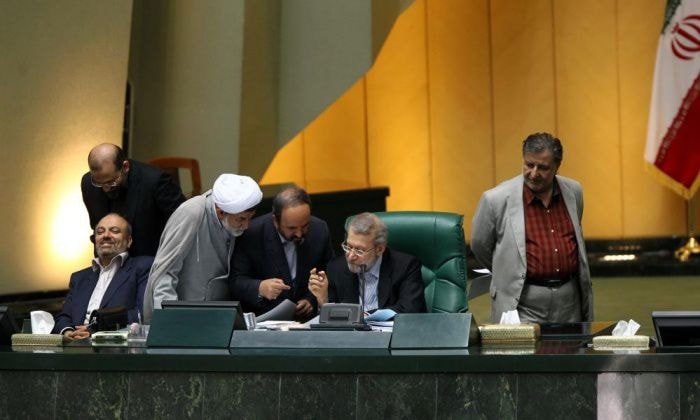Iran "on the defensive" as the deadline for an agreement with P5+1 approaches
(Baonghean) - Iran's parliament has just voted to pass a bill with many provisions aimed at "protecting Iran's national interests" against US demands. This move by Iran is believed to be able to hinder negotiation efforts between Iran and the P5+1 group (including the US, UK, France, Russia, China and Germany), as the deadline to reach a final agreement between the parties is approaching.
Iran puts up more obstacles
Iran’s parliament passed the bill with 199 votes in favor, 3 against and 5 abstentions, which bans international inspectors from accessing “sensitive” military, security and non-nuclear sites, as well as nuclear documents and scientists. The bill also stipulates that Iran will be allowed unrestricted access to peaceful nuclear knowledge, technology, research and development in “acceptable” areas, and all sanctions against Iran must be lifted on the day of the agreement. Only when all three conditions are met will the negotiations between Iran and the P5+1 group be valid.
 |
| Iran's parliament debates during a vote on the bill. Photo: The Guardian |
The bill that the Iranian parliament has just passed must be reviewed and approved by the Revolutionary Guard Council - Iran's constitutional watchdog - to become law. According to analysts, when officially enacted into law, this bill could hinder negotiation efforts between Iran and the P5+1 group when Iran's interests are too strictly protected. After reaching a "historic" agreement in Lausanne, Switzerland in April, Iran and the P5+1 are now in the decisive negotiation phase to reach a final agreement in just over a week.
However, one of the biggest disagreements between the two sides is the rights and access of international inspectors to Iran's nuclear facilities as well as the time limit for lifting sanctions. Even with the preliminary agreement signed in Lausanne, people have noticed the "uncertainty" of not clarifying whether unilateral sanctions imposed by the US, the European Union and the United Nations on Iran will be lifted or only suspended, and when will they start? Who and by what mechanism will assess Iran's implementation of the agreement as a prerequisite for lifting sanctions? Up to now, the West has been leaning towards the option that the international community can inspect any place suspected of having secret nuclear facilities and the inspection will last from 20 to 25 years.
The US State Department also issued a statement on June 21 stating: “All parties clearly understand what needs to be included in the final agreement, including access to nuclear facilities, and we will never accept signing a treaty without this condition.” Regarding the lifting of sanctions, the West proposed that the European Union's sanctions be lifted first, the US sanctions be lifted after confirming Iran's compliance with the agreement, while certain UN sanctions are still maintained. Therefore, Iran's "finalization" that the sanctions must be lifted immediately upon signing the agreement, and at the same time "banning" international inspectors from facilities identified by a very "vague" adjective as "sensitive" is no different than placing more obstacles in front of the negotiating teams of both sides in the process of reaching an acceptable agreement.
Is the June 30 deadline feasible?
According to the latest information sent back from Vienna (Austria), negotiators from Iran and the P5+1 group have met five days a week for the past several weeks, demonstrating great efforts from both sides in this “sprint” phase. However, according to the description of some diplomats who have access to these negotiations, the document that the two sides are trying to draft looks “very patchwork with lines mixed with dozens of blank lines”, not to mention 4 or 5 attached annexes that are not yet complete.
Russia's chief negotiator, Sergey Ryabkov, also said that "the progress of negotiations is slowing down." Over the past several weeks, Iran's supreme leader, Ayatollah Ali Khamenei, has continued to resist US demands for inspectors to have access to military facilities and interview nuclear scientists. Therefore, although the deadline set by both sides for reaching a framework agreement is June 30, both sides believe that this is an impossible task. Currently, some sources say that the negotiations will likely have to be extended until July 9. Meanwhile, Iranian Foreign Minister Mohammad Javad Zarif also affirmed that his country is not under time pressure to reach a comprehensive agreement with the P5+1 group. However, Mr. Zarif is criticizing the P5+1 group for making "excessive demands" during the negotiation process, and at the same time declaring that Iran will not back down in the face of such pressure.
Protecting Iranian negotiators from “excessive demands” is also the purpose of the Iranian parliament members when voting to pass the bill related to the core issues in the Iran nuclear negotiations. However, a well-known principle in difficult negotiations is that the parties must know when to advance and retreat, and must know how to make concessions to a certain extent to reach an agreement acceptable to both. Therefore, once Iran is determined to “take a defensive position” with regulations that ensure maximum benefits for itself, while the West is also “no pushover”, perhaps the assessment that Iran and the P5+1 group can sign a final agreement on July 9 is still too optimistic.
Thuy Ngoc
| RELATED NEWS |
|---|






